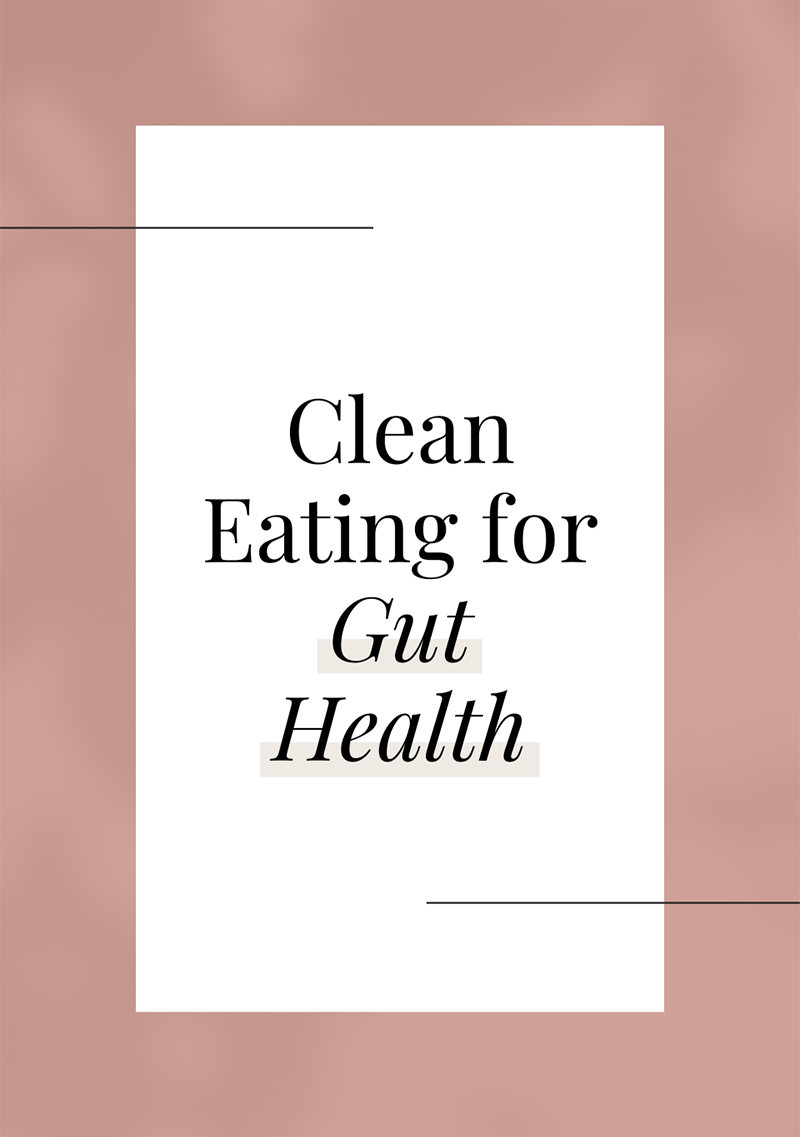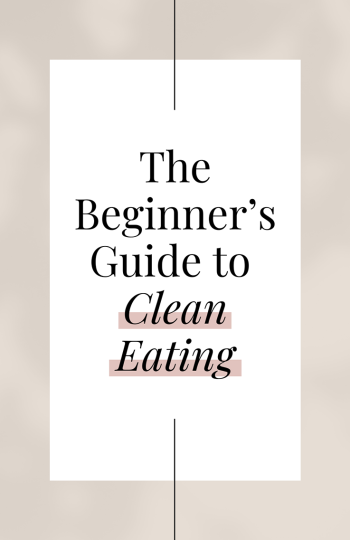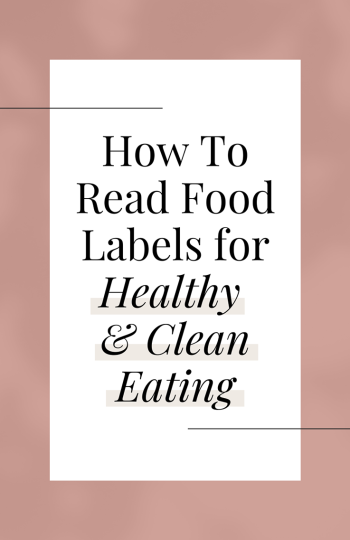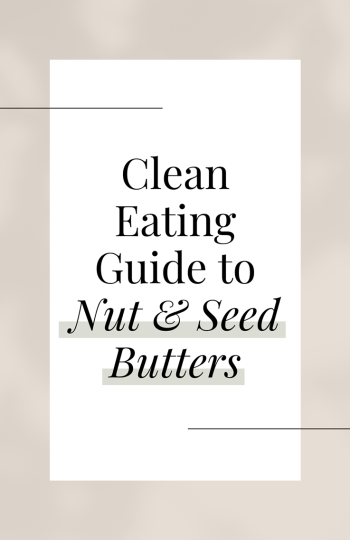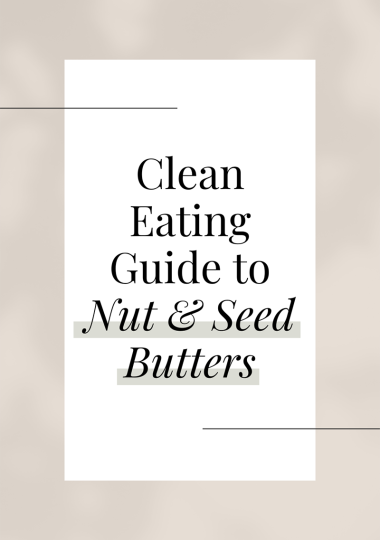What would you say are the most “important” parts of the body? The heart? Lungs? Nervous system? What about your gut?
The gut has been overlooked for a long time. No one wants to think about the bacteria and undigested food that is moving through that area,but the gut is more important to your health than you may think. As inflammation and chronic illnesses are becoming more prevalent in conversations about nutrition and health, the gut is making an appearance, too.
Have questions about gut health? You’re not alone! I get plenty of questions about why the gut is important, what nutrients affect the gut, and how to eat clean for gut health. All of your questions can be answered in this blog post! Look out for recipes, tips, and fun facts along the way.
Do you have the “guts” to learn about the importance of gut health? Then start reading!
Why is gut health so important?
Health experts refer to our gut as our “second brain.” When we consume food, it is digested, metabolized, and absorbed in our guts. From there, nutrients are delivered into the cells to provide the body with energy. This area is so important to our overall health!
Want to know a crazy fact about your gut? There are more nerve endings in this area than in your entire central nervous system! We’ve got a lot going on in our guts, but we don’t always think about how to keep it healthy and functioning.
Good gut health benefits your body in so many ways: it is tied to a stronger immune system, increased levels of energy, better digestion, lower inflammation, and a stronger heart and brain. Over 70% of the immune system exists within the gut. When your body produces antibodies that protect you from viruses and foreign bacteria, you should thank your gut.
What is a gut microbiome?
The gut is made up of trillions of microorganisms (or microbes), including bacteria, fungi, and viruses. These microorganisms are known as your “microbiome,” and they can affect various functions in the body. Your mood, sleep patterns, and ability to fight infections are all affected by the trillions of microorganisms in your gut microbiome.
Although fungi and viruses also exist in the microbiome, scientists spend more time and research looking at bacteria. Over 100 trillion bacteria, made up of over 1,000 species of bacteria, live in the gut microbiome and assist different functions in the body. “Good bacteria” can help all of the functions in your body run smoothly. “Bad” bacteria can be extremely harmful for your health. An unhealthy gut has been linked to weight gain, autoimmune conditions, and migraines!
Although we are exposed to microbes from the minute we are born, diet affects our gut microbiome the most. Poor diet can wreak havoc on the gut, indirectly wreaking havoc on the immune system, digestive system, and other systems throughout the body.
What are the most important nutrients for gut health?
As you shop for snacks or plan out your meals, make sure you are getting the recommended amounts of these gut-friendly nutrients: fiber, probiotics, and magnesium! Keep reading for more details (and a list of foods containing these nutrients!)
What is a leaky gut?
The lining of our gut keeps food and nutrients moving through the digestive system and out of other areas of the body. This lining isn’t completely solid. When certain foods in our diet (sugar, processed foods, alcohol, etc.) enter the gut, they may affect the lining and create holes. This allows more half-digested food to permeate the gut and enter into other areas of the body. Large cracks and holes in our lining create a condition known as “leaky gut,” or “intestinal permeability.”
If the wrong substance leaves the gut and affects the surrounding tissue, chronic inflammation can occur. Other bacteria within the gut may be affected, too. A healthy gut is strong, without large holes and cracks, and assists our body do everything it needs to do throughout the day.
What factors can destroy gut health?
Clean eating is an important practice in maintaining gut health. If you’re not getting the right nutrients in your diet, your gut health will suffer. Unfortunately, we don’t always choose foods that are high in fiber and prevent leaky gut. The average American is only eating 16 grams of fiber a day. With recommended doses being 21-25 grams, our lack of fiber can increase the risk of leaky gut and other gut-related issues.
Other factors that destroy gut health include:
- Having a C-section (babies are exposed to different strains of bacteria)
- Antibiotics (they kill both good and bad bacteria!)
- Age
- Genetics
- Increased stress
- High sugar intake
- Consuming alcohol
- Eating processed foods, gluten, soy, and refined sugars
How to know if your gut health is in need of repair?
Our guts are connected to so many different areas in the body. Poor gut health may show up in your mood, on your skin (think psoriasis), or while you’re trying to sleep. Any of the following symptoms may be a sign to eat more fiber or focus on gut-healthy foods:
- Trouble sleeping
- Stomach pain
- Fluctuating weight
- Autoimmune conditions
- Acne or inflamed skin
- Brain fog
- Food sensitivities
How can you improve your gut health?
A healthy diet and lifestyle can help to prevent leaky gut and increase the presence of “good” bacteria in your gut microbiome. While some of these changes require an adjustment to your lifestyle, looking out for your gut can be as simple as chewing your food slowly (this eases the digestive process and gives your body less work to do)! Try some of these healthy practices to improve your gut health:
- Experiment with your diet and identify any food sensitivities or intolerances
- Exercise regularly
- Get more sleep
- Reduce stress through meditation, boundary-setting, or reaching out to a mental health professional
- Hydrate
- Add probiotics and prebiotics to your diet with foods or supplements
What are probiotics?
One way to ensure that your “good” gut bacteria outweighs the “bad” bacteria is by consuming probiotics. Probiotics help to repopulate the gut with good bacteria that help various systems in the body run smoothly. They can form Vitamin K, regulate weight, and even affect your mood. Good bacteria in your diet can actually help to reduce stress!
You can purchase probiotic supplements, but it’s best to consult a doctor to know which option is best for you as everyone’s microbiome and gut bacteria differs. Foods that contain probiotics are fermented foods such as kefir, tempeh, kimchi, and miso.
What are prebiotics?
Gut health is more than maintaining a healthy diet for yourself – your bacteria needs to maintain a healthy diet, too! The “good” bacteria in your gut feed on plant fibers called prebiotics. A healthy diet of prebiotics and probiotics is linked to a healthy immune system, healthy weight, and healthy gut. Foods that contain prebiotics include asparagus, onion, sunchokes, and chicory root!
What foods should you eat to improve gut health?
Remember, fiber, probiotics, and magnesium are crucial in maintaining a healthy gut. Get your recommended daily amount of these nutrients to ensure that your gut stays strong and helps your body function properly!
High-fiber foods that improve gut health:
- Asparagus
- Bananas
- Beans (black beans, chickpeas, kidney beans, etc.)
- Berries
- Leeks
- Legumes (peas, peanuts, lentils, etc.)
- Oats
These ingredients can be added to any meal. Try my Banana Egg Breakfast Pancakes, Summer Bean Salad, or Peanut Butter Chocolate Chip Muffins!
Fermented foods that improve gut health:
- Kefir
- Kimchi
- Kombucha
- Miso
- Sauerkraut
- Tempeh
- Yogurt
Fermented foods can still taste fresh – my Maple Miso Brussel Sprouts with Pecans & Apples or Veggie Ramen will make your gut happy and healthy!
Magnesium-rich foods that improve gut health:
- Beans
- Dark leafy greens
- Fish
- Nuts
- Whole grains
Improve gut health tonight by making my Bok Choy Spinach Salad with Sprouted Almonds or Vegan Kale Chips!
Collagen is the most prominent protein in the body, and can also improve gut health. These foods help your body increase collagen production and protect your gut:
- Bone broth
- Cashews
- Egg whites
- Garlic
- Leafy greens
Homemade cashew ricotta is a great, plant-based way to encourage collagen production! Try it in my Acorn Squash Tart or in my Zucchini Roll-Ups!
It takes “guts” to read labels, plan your meals, and swap out sugary snacks for healthier options. Once you do, your gut will thank you. A healthy gut helps your entire body sleep better, heal faster, and process the delicious food you eat in a safer way. Are you surprised to learn how important your gut is to your overall health? Let me know in the comments!
